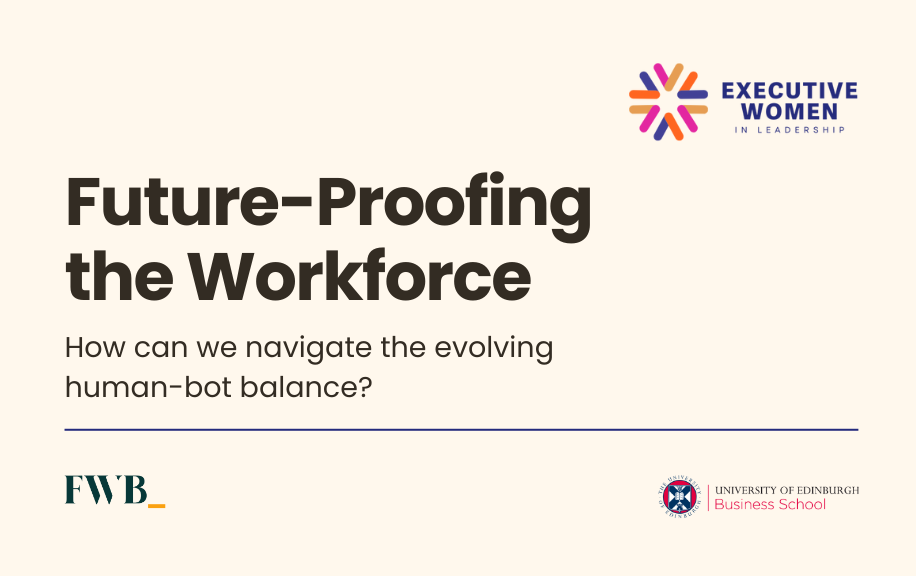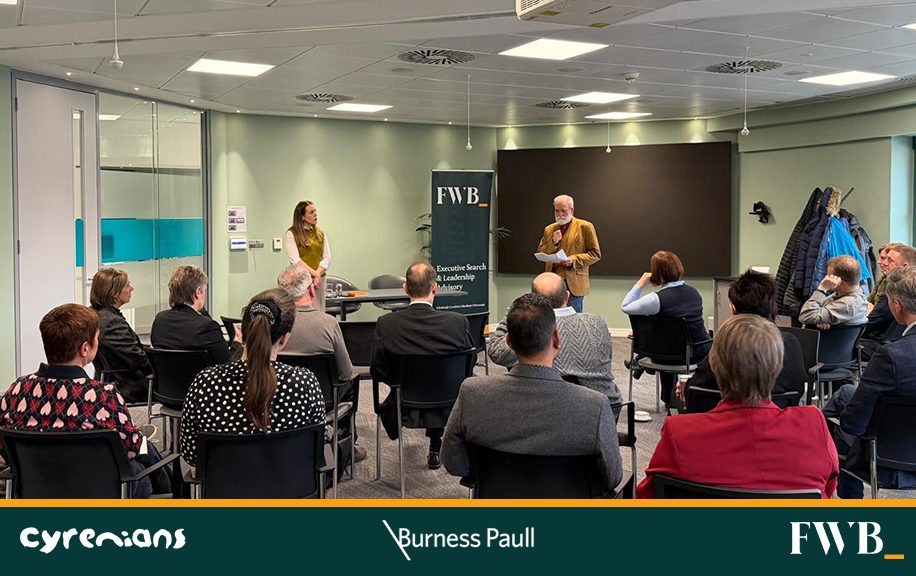Contact the team at FWB to discuss your individual or company requirements, or to discover more about our specialist services.
Future-Proofing the Workforce in the Age of AI
10 November 2025
- FWB Events
- EWIL

As organisations navigate an era dominated by AI, automation, and emerging technologies, leadership faces a critical challenge: preparing people, processes, and culture for a future where humans and technology thrive together.
FWB recently co-hosted an Executive Women in Leadership event at the University of Edinburgh Business School, where we were joined by a panel of senior leaders who explored this question through four core themes.
- How AI Is Changing Organisations and Jobs
- Preparing Leaders and Teams for the Future
- Overcoming Barriers to AI Adoption
- Practical Steps Leaders Can Take Now
As highlighted in the Chair’s opening remarks, AI is increasingly integrated across sectors—from fintech and digital identity to robotics and bioengineering—making foundational technologies like cloud and data more critical than ever.
Alongside our Chair, Clare Reid (Strategic Innovation Director at FinTech Scotland), we were delighted to be joined by four exceptional speakers whose insights helped shape the conversation:
Jana Werner
Enterprise Strategist at Amazon Web Services, Jana advises Fortune 500 executives on building adaptive, customer-centric organisations. Her career spans digital transformation in financial services, scaling tech startups, and global change leadership at DHL. Jana is also a published author on topics relevant to AI and workforce evolution.
Ana Stewart
Entrepreneur and investor, Ana founded fintech firm i-design, later acquired by Cardtronics. Now a partner at Eos Advisory, she supports high-growth ventures and sits on several boards. Ana co-authored the influential Pathways report on women’s entrepreneurship and was recently appointed Chief Entrepreneur for the Scottish Government.
Nicola Anderson
CEO of FinTech Scotland, Nicola leads one of Europe’s most dynamic fintech clusters. With a background in financial regulation at the FCA, she has helped scale the sector significantly, attracting over £1.8bn in investment. Nicola also founded the Financial Regulation Innovation Lab, driving tech-enabled compliance and financial inclusion.
Vicki Ferrier
Former Chief People & Commercial Officer at Konsileo, Vicki has led HR and finance transformations across major firms including The Very Group and Procter & Gamble. She now collaborates with WILD Learning on data-driven tools that develop the human intelligences essential for thriving in AI- and quantum-enabled workplaces.
How AI Is Changing Organisations and Jobs
AI is no longer a distant concept – it is already embedded in everyday operations. From content creation and summarisation to data analysis, fraud detection, and workflow automation, organisations are leveraging AI to improve efficiency and productivity. Yet, maturity levels remain modest. A live poll revealed that attendees rated their organisations’ AI maturity at just 2.5 out of 5, while their own leadership competency scored slightly lower at 2.3 out of 5. This gap highlights a pressing need for upskilling and cultural readiness.
- Rate your organisation’s maturity in adopting AI: 2.5/5
- Personal AI competency as leaders: 2.3/5
AI is reshaping organisational structures and job roles. One speaker suggested that the technology could reduce layers of middle management, challenging traditional hierarchies. Tools like ChatGPT, they noted, can evolve into “meta-relational mentors,” raising questions about the quality of human-manager interactions. Another perspective emphasised that AI is a general-purpose technology and adoption is “everyone’s job,” warning that companies that fail to adopt it risk losing relevance. For start-ups, AI is a lifeline – accelerating processes and freeing up time for strategic work. Across sectors, entry-level roles are shifting as routine tasks become automated, requiring stronger problem-solving and relationship-building skills.
Preparing Leaders and Teams for the Future
Preparation goes beyond technical skills – it is about mindset and culture. Leaders must embrace continuous learning and model curiosity, creating safe spaces for experimentation where teams can test and learn without fear of failure. One panellist stressed the importance of conversations and reflection, arguing that without these, technical progress is meaningless. Another reinforced this point by sharing that curiosity and communication are the top traits sought in leaders. Boards, they said, need tech-curious members who empathise with technological fears and can guide organisations through change.
As one speaker put it, success in this era is about “mindset, not mastery” – the ability to adapt and learn continuously rather than striving for perfection from the outset. Human skills remain critical. Empathy, adaptability, and the ability to foster collaboration will determine whether organisations succeed in integrating AI. Leaders must not only understand technology but also create conditions where people feel heard and empowered to contribute.
Balancing Risks and Opportunities
While AI offers transformative potential, concerns remain about job displacement, decision-making bias, and ethical misuse. A recent study by King’s College1 found that entry-level and highly specialist roles are being reduced, while customer-facing roles are less disrupted. Yet, the long-term outlook is optimistic. The Bank of England sees AI as a driver of productivity, and its ability to personalise services, accelerate drug development, and remove mundane tasks is already reshaping industries. As one speaker noted, “It’s happening—so we need to embrace it, not least to stay competitive.”
Overcoming Barriers to AI Adoption
Despite the opportunities AI presents, significant barriers remain—cultural resistance, fear of job loss, and lack of infrastructure often slow progress. The discussion highlighted practical strategies to overcome these challenges, with Jana Werner identifying three recurring themes that hinder successful adoption.
First, clarity is essential. Organisations must define their purpose and establish clear metrics to guide AI integration. Without a shared understanding of why AI matters and what success looks like, efforts can quickly lose momentum. Second, ownership matters. Individuals need the freedom to make decisions and experiment without fear of career risk. Creating a culture where people feel safe to innovate is critical for progress. Third, and perhaps most importantly, curiosity must be embedded in everyday practices. Jana encouraged leaders to build “curiosity muscles” by asking questions, challenging assumptions, and normalising failure as part of learning.
She referenced former PepsiCo CEO Indra Nooyi’s “7 C’s of Leadership,” highlighting two essential skills for the AI era: curiosity and communication. Curiosity drives innovation and strategic thinking, while communication is the foundational skill that enables leaders to persuade others and drive change. These qualities are not optional; they are vital for navigating technological transformation.
The panel also reflected on leaders who were once perceived as disruptors but ultimately delivered transformative cultural change, citing Anne Boden’s pioneering work in digital banking as an example. They noted that AI adoption feels similar: challenging at first, but ultimately necessary for progress. As Ana Stewart summed up, “The wait-and-see approach is over. Experiment and embrace it, or risk being left behind.” This sentiment captured the urgency of the moment: organisations can no longer rely on a “divine right” to exist. Adaptation is not just a competitive advantage; it is a survival strategy.
Practical Steps Leaders Can Take Now
The discussion moved from strategy to action, with panellists sharing practical ideas for getting started. Ana recommended applying AI to simple tasks, such as minuting meetings, to demonstrate immediate value. Jana suggested exploring free online resources to begin experimenting and learning. Vicky reminded leaders that developing human skills – such as self-awareness and team reflection – is just as important as technical know-how. These small steps can build confidence and momentum, helping organisations move forward without overwhelming their teams.
Beyond AI: Other Technologies to Watch
While AI dominated the conversation, the panel also highlighted other technologies shaping the future. Cybersecurity remains a primary concern for organisations of all sizes, according to Ana Stewart. Jana emphasised the importance of cloud and data foundations, noting that high-quality, connected data is essential for scaling AI effectively and securely. Nicola Anderson pointed to blockchain as a transformative force in payments and financial infrastructure, while quantum computing was flagged as a future game-changer alongside AI.
Future Talent and Inclusive Leadership
The conversation turned to the next generation of talent. Digital natives bring fresh skills, but are organisations creating enough opportunities for them? The panel suggested reimagining traditional graduate schemes and introducing reverse mentoring, allowing younger employees to share their tech fluency directly with executive teams. Flattening hierarchies and focusing on contributions from all levels will help organisations tap into diverse perspectives. To influence leadership, buy-in, and technology adoption, value and experience must always be connected to business outcomes, speaking in the leader’s “currency.”
Data quality also emerged as a critical enabler. Without confidence in data, it isn’t easy to move at pace. Leaders should take small, incremental steps rather than attempting to “boil the ocean,” ensuring progress is sustainable and aligned with organisational goals.
Closing Reflections
The event closed with a powerful reminder from Judy Wagner, Co-Founder of FWB:
“To be a successful leader, we need to embrace change – whether it’s AI today or railways decades ago. And as leaders, we need to foster a culture which encourages curiosity, empathy, and a willingness to learn and share together.”
Panellists left attendees with practical takeaways. Vicky urged leaders to prioritise self-awareness and reflection, Jana encouraged experimentation through free tools, and Ana demonstrated how simple applications of AI can deliver immediate value. The overarching message was clear: success in the age of AI requires not just technical adoption but cultural transformation.
FWB will continue to convene conversations that challenge, inspire, and equip leaders to shape the future of work with confidence and purpose.
We are looking forward to our next EWIL event, taking place on the 14th January, which will focus on Embedding AI Within Transformation Programmes from a leadership perspective.
The discussion will delve into key themes, which will include: Where, why and how to strategically implement AI; moving beyond pilots to actual business transformation; responsible AI practices and ESG responsibilities.
Our expert panel will also explore the question: Do our traditional business transformation leadership and approaches enable wide-scale AI adoption at the pace needed to gain the benefits?
To RSVP to our next event, please email: events@fwbltd.com






